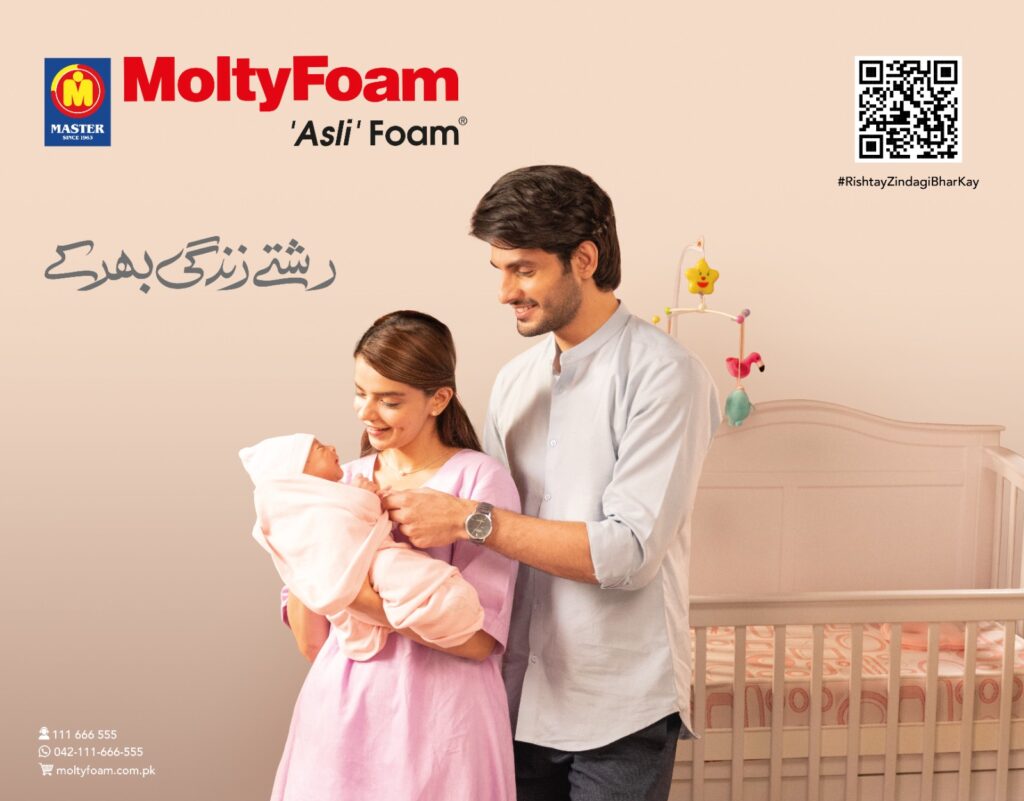When a baby is born, the house fills with joy. Families gather, blessings pour in, and all eyes turn toward the newborn. In Pakistani households, especially, the arrival of a baby is celebrated with warmth and festivity. Yet, amid the laughter and celebrations, one person often becomes invisible, the mother.
For generations, traditions have placed the baby at the center of attention, while the woman who endured the pain of childbirth is quietly expected to “manage.” She is often judged, sidelined, or left to recover alone while the family surrounds the crib instead of her bedside.
MoltyFoam’s new TVC challenges this deeply rooted mindset. With a powerful, emotional story, it highlights the importance of extending care beyond the baby, to the mother who needs healing, comfort, and support just as much.
The Untold Side of AfterBirth
While the world celebrates the newborn, a new mother faces struggles that often go unseen.
She must physically recover from labor or surgery, navigate fluctuating hormones, and cope with exhaustion while adjusting to her new role. Many also experience child birth depression or anxiety, yet these conversations are rarely had at the dinner table.
Instead, she is frequently subjected to criticism:
- “Our mothers managed without complaining.”
- “She needs to be stronger.”
- “Why can’t she handle the baby on her own?”
MoltyFoam’s new TVC puts these realities front and center. It gently reminds us that the journey of motherhood doesn’t end at birth, it continues, and the family’s role in it is crucial.
Breaking Traditions, Redefining Care
Pakistani dramas and cultural stereotypes often highlight the tensions between mothers-in-law and daughters-in-law. But MoltyFoam’s TVC flips this narrative. Instead of conflict, it shows compassion. Instead of rivalry, it portrays unity.
In the film, the mother-in-law and sister-in-law are seen supporting the new mother with love and kindness. They help her rest, care for her, and ensure she feels at home. The husband, too, plays a central role, not just as a provider but as a partner who actively prioritizes his wife’s well-being.
This portrayal breaks long-standing traditions of neglect and scapegoating, offering instead a vision of what families can look like, households where love replaces judgment and care replaces criticism.
Why the Mother Matters Just as Much as the Baby
A healthy, supported mother means a healthier child. After birth care is not only about sleepless nights and feeding schedules; it’s about ensuring the woman who brought life into the world is nurtured too.
The TVC beautifully captures this truth. It highlights that while there are always countless hands to hold the baby, the mother also deserves hands that comfort her, shoulders that support her, and products that help her heal.
MoltyFoam’s message is clear: caring for a newborn and caring for the mother are inseparable responsibilities.
MoltyFoam’s Mom and Baby Range: Comfort Designed for Healing
One of the most striking moments in the TVC is when the husband brings home MoltyFoam’s Mom and Baby Range products for his wife. This gesture is symbolic; it says, “Your comfort matters as much as the baby’s.”
The Mom Range is specifically designed to support post-pregnancy needs:
- Products that ease back pain and body aches.
- Solutions that promote restful sleep.
- Comfort that allows mothers to recover physically and emotionally.
By weaving this into its narrative, MoltyFoam, the best mattress brand in Pakistan, is not just advertising a product; it’s advocating a cultural shift. It’s encouraging families to rethink their priorities, to make space for the mother’s well-being alongside the baby’s.
Husbands, Mothers-in-Law, Sisters-in-Law: A Shared Role
The TVC also emphasizes the shared responsibility of family members.
- Husbands are shown as active partners who care for their wives, breaking away from the outdated stereotype of being “just providers.”
- Mothers-in-law are depicted as empathetic guides, offering love and reassurance instead of control.
- Sisters-in-law play the role of companions, easing the new mother’s burden with simple but meaningful gestures.
This collective effort is the heart of the message. When the whole family comes together for the mother, the household becomes a place of healing, not stress.
A Campaign That Resonates Beyond Borders
Although deeply rooted in Pakistani culture, MoltyFoam’s new TVC tells a story that resonates globally. Across societies, mothers face the same reality: attention shifts to the baby while their struggles remain hidden.
By giving voice to these mothers, the TVC speaks to women everywhere who have felt unseen during the most vulnerable chapter of their lives. It’s a reminder that motherhood is not just about sacrifice; it is also about receiving care, dignity, and comfort.
Changing Narratives, Inspiring Homes
What makes this campaign powerful is its authenticity. It doesn’t exaggerate or dramatize, it reflects real homes, real struggles, and real possibilities for change.
In doing so, MoltyFoam positions itself not just as a provider of comfort products, but as a brand that understands the human stories behind them. It becomes a symbol of empathy, reminding us that comfort is not a luxury; it’s a necessity for mothers who give so much of themselves.
Conclusion: Redefining Motherhood Care
For too long, traditions have sidelined the mother after childbirth, leaving her to navigate recovery alone. But MoltyFoam’s new TVC boldly redefines this narrative. It shows that families can choose compassion over conflict, support over judgment, and unity over division.
By shining a light on after birth care, the campaign urges us all to rethink how we treat mothers in our homes. It calls on husbands, in-laws, and extended families to extend their love not only to the newborn but to the woman who made that miracle possible.
With its MoltyMom and Baby range, MoltyFoam has gone beyond comfort products, it has sparked a conversation. A conversation about breaking traditions, prioritizing mothers, and building families rooted in care.
Because when we nurture the mother, we nurture the entire family.

